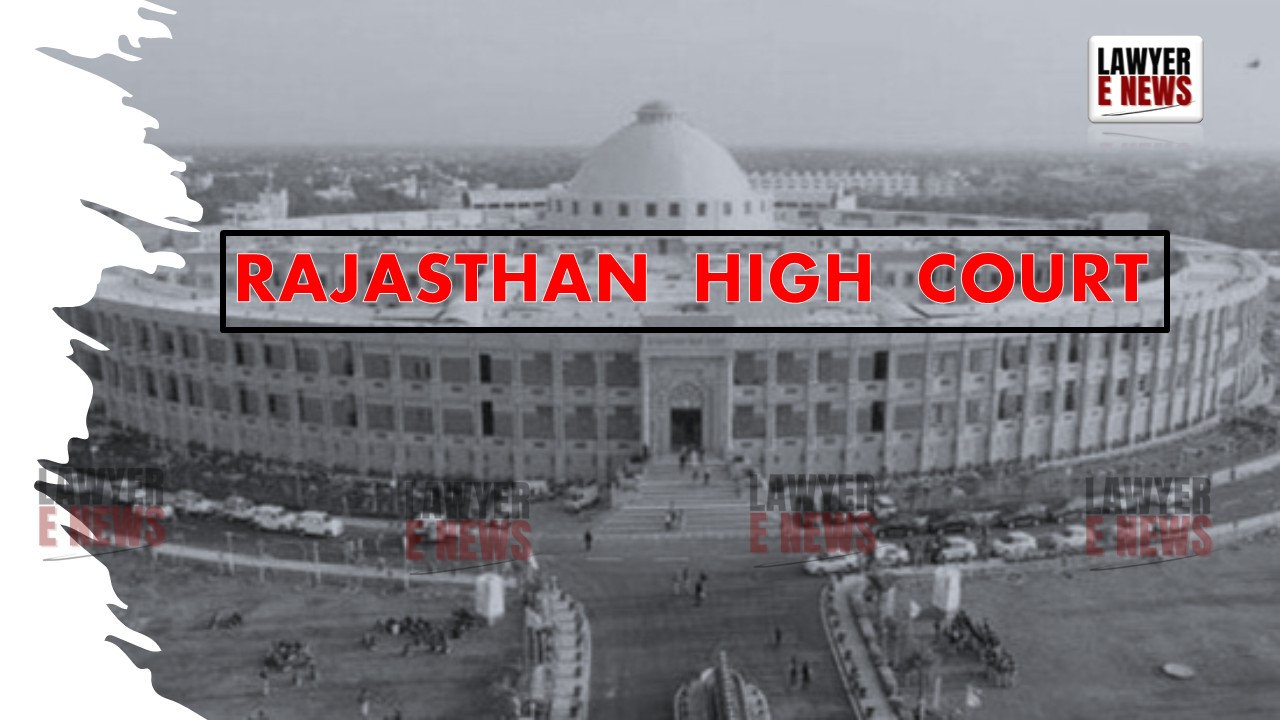-
by Admin
16 February 2026 4:21 AM



Demand and Acceptance are "Sine Qua Non" for Conviction Under the Prevention of Corruption Act - Rajasthan High Court quashed the conviction and sentence of a police officer, Bhagwan Singh, accused of accepting a bribe under the Prevention of Corruption Act, 1988. Justice Ganesh Ram Meena observed that the prosecution had failed to establish the mandatory ingredients of demand and acceptance of illegal gratification.
The Court remarked: “Proof of demand and acceptance of illegal gratification is sine qua non for establishing an offence under Sections 7 and 13(1)(d) of the Prevention of Corruption Act. Mere recovery of tainted money from the accused, without evidence of demand and acceptance, cannot sustain a conviction.”
The case arose from allegations that Bhagwan Singh, a head constable, demanded and accepted a bribe of Rs. 20,000 to release a man, Imrat, who was allegedly detained illegally at Malakhera Police Station in Alwar district. The Anti-Corruption Bureau (ACB) claimed to have caught the appellant red-handed during a trap operation. Following this, the appellant was convicted by a Special Judge (Anti-Corruption Court) on January 4, 2016, and sentenced to four years of rigorous imprisonment.
The appellant challenged the conviction, arguing procedural irregularities, lack of evidence of demand and acceptance, and inadmissibility of electronic evidence presented by the prosecution.
The High Court highlighted that key witnesses, including the complainant Nazir (PW4), turned hostile during the trial, casting doubt on the prosecution’s case. Nazir testified that the bribe money was forcibly placed in the appellant’s pocket under pressure from ACB officials. He categorically denied the appellant ever demanded or accepted the bribe.
The Court also noted that other witnesses, including Shahbudin (PW1), Imrat (PW2), and Parmal (PW3), similarly turned hostile. None supported the prosecution’s claim of demand or acceptance of the alleged bribe.
The Court observed: “When material witnesses, including the complainant, have turned hostile and denied the allegations of demand and acceptance, the prosecution’s case is rendered doubtful. The benefit of doubt must go to the accused.”
Electronic Evidence Rejected Due to Non-Compliance with Section 65B of the Indian Evidence Act
The prosecution presented electronic evidence, including recorded conversations, to support allegations of demand and acceptance of the bribe. However, the High Court declared the electronic evidence inadmissible due to non-compliance with Section 65B of the Indian Evidence Act, 1872, which mandates a certificate for the admissibility of electronic records.
Relying on the principles laid down in Arjun Panditrao Khotkar v. Kailash Kushanrao Gorantyal (2020) 7 SCC 1, Justice Meena stated: “The certificate required under Section 65B(4) is a condition precedent to the admissibility of evidence by way of electronic record. Oral evidence in place of such certificate cannot suffice.”
The Court further noted that the voices in the recorded conversation were not authenticated as belonging to the appellant. The prosecution did not collect voice samples to verify the alleged voice of the accused.
The Court found several procedural lapses in the trap proceedings conducted by the ACB. The complainant himself testified that the bribe money was forcibly placed in the appellant’s pocket under instructions from the ACB officials. Moreover, no clear signal for activating the trap was established during the trial.
The Court emphasized that recovery of tainted money alone is insufficient for conviction under the Prevention of Corruption Act. Justice Meena clarified:
“Recovery of tainted money, without corroborative evidence of demand and acceptance, is insufficient to sustain a conviction.”
Referring to the Supreme Court’s ruling in Neeraj Dutta v. State (2023) 4 SCC 731, the Court reiterated that proof of demand and acceptance is essential for conviction under Sections 7 and 13(1)(d) of the Prevention of Corruption Act. Justice Meena explained: “The burden of proof lies squarely on the prosecution to establish guilt beyond reasonable doubt. Convictions cannot be based on surmises, conjectures, or probabilities.”
The Court also referred to Shivaji Sahabrao Bobade v. State of Maharashtra (1973) 2 SCC 793, which emphasized that “the accused must be proven guilty beyond reasonable doubt, and mere suspicion or conjecture cannot take the place of legal proof.”
The Court noted discrepancies in the investigation, particularly regarding the role of SHO Yadav, who was initially named in the complaint but was later excluded from the case. The appellant, Bhagwan Singh, who was subordinate to SHO Yadav, argued that he was being used as a scapegoat.
Justice Meena remarked: “When the prosecution itself failed to implicate SHO Yadav, who was the main accused in the initial complaint, convicting the appellant solely based on conjectures and procedural lapses is not sustainable.”
Allowing the appeal, the Rajasthan High Court quashed the trial court’s judgment and acquitted the appellant of all charges. The Court observed that the conviction was based on inadmissible evidence and uncorroborated testimony.
Justice Meena concluded: “In the absence of credible evidence to prove demand and acceptance of bribe, and given the procedural irregularities and inadmissibility of electronic evidence, the conviction of the appellant is illegal, perverse, and unsustainable.”
The Court also directed the appellant to comply with Section 437-A of the Code of Criminal Procedure, requiring the execution of personal and surety bonds for six months in case of any future appeal.
This judgment serves as a significant reiteration of the legal principles governing corruption cases:
Demand and Acceptance: The prosecution must establish both demand and acceptance of a bribe as a fact in issue to sustain a conviction under the Prevention of Corruption Act.
Admissibility of Electronic Evidence: Non-compliance with Section 65B of the Indian Evidence Act renders electronic evidence inadmissible in court.
Trap Proceedings: Procedural lapses in trap cases, such as absence of corroboration or evidence of coercion, can undermine the prosecution’s case.
Benefit of Doubt: Where material witnesses turn hostile and the evidence is insufficient to prove guilt, the accused is entitled to the benefit of doubt.
Date of Decision :January 24, 2025
